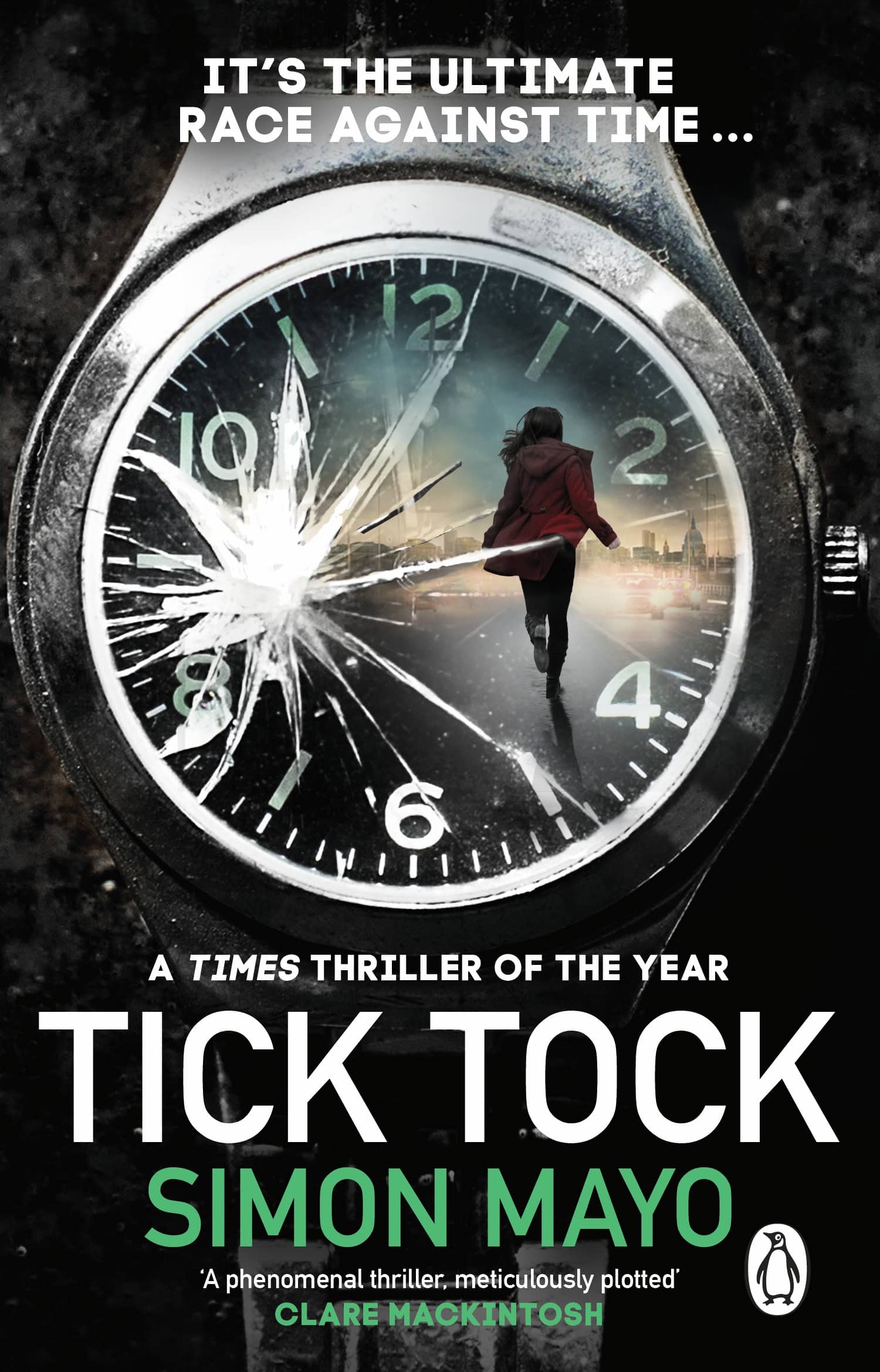Books
Extract: Tick Tock by Simon Mayo
Tick Tock is the engrossing new thriller from Simon Mayo. A timely story that’s both smart and intriguing, you won’t want to put it down.
It starts quietly enough. A tick tick ticking you can hear in your ear. Tinnitus, you think. It will pass. But it doesn’t. It gets worse. And then you pass it on. Before you know it, it spreads. Elsewhere across the globe, it emerges: small outbreaks at first, but then suddenly it’s a plague – and only days later it is already killing people.
In an increasingly affected north London school, teacher Kit Chaplin is struggling to understand what he is witnessing. Even Lilly Slater, his partner and an eminent vaccinologist, can’t work out what’s happening. As it spreads, little by little, they are inexorably drawn into the mystery behind the illness. And what they discover will change the world as they know it…
Read on for the opening pages of Tick Tock by Simon Mayo…
Tick Tock
by
Simon Mayo
The driver of the Freightliner 27 bus flicked his tired eyes to the mirror. At 6.37 a.m., it should have been busy. Three quarters full at least. Commuters and returning, sleeping nightshift workers in the main. But he had nine passengers – only nine – and every one of them was silent.
The ID swinging from his neck showed a man happier and heavier than the image in the mirror. He drove slowly, with just one eye on the road. His passengers were nervous; he was nervous. He wouldn’t have shown up for work at all if his girlfriend hadn’t called him a pussy.
Another glance in the mirror.
Bolt upright, the nine were watching each other, their eyes darting from passenger to passenger. Nervous, watchful, listening. Above all, listening. When the bus was moving and its 600hp diesel engine was clattering noisily, deafeningly, the relaxation was visible: an exhaled breath, a drop of the shoulders. But whenever it slowed down, or spent any time at traffic lights, the delay was greeted with wider eyes and tighter lips. No one was wearing headphones.
Two white men sat at the back, the only passengers sitting close enough for a conversation, but they too had fallen silent. There was colour in their cheeks from the cold outside but otherwise their faces were pale, strained. In front of them, a grey-haired black woman, her handbag clutched to her chest like a shield, stared resolutely ahead. Only her slightly cocked head revealed her alertness, her awareness of possible danger. A muffled and swathed schoolgirl sat three seats in front of her, hands gripped around a book she manifestly wasn’t reading. A young black Salvation Army officer stood in the aisle, trying and failing to smile, her gloved hand holding tightly on to the back of a seat. The other four passengers wore white face masks that covered their mouth and nose; one stood by the driver, and the other three sat alone, as far apart as the bus allowed. On one of the misted-up windows, a previous passenger had written ‘Silence’, the letters now running with condensation.
The number 27 slowed as it approached a stop. Nine heads whipped left to see who was waiting.There’s someone else?
It was a middle-aged man, fifties, salt-and-pepper beard, rough working jacket, a scarf wrapped loosely around his neck. An icy blast blew in and the driver punched the doors closed behind him. The man was waved through without paying and immediately sized up his fellow travellers. He pulled the scarf away from his face.
‘I’m fine. No need to worry on my score,’ he called. Londoner. A ragged voice. A smoker, probably. His cheery tone aroused nothing but suspicion in the nine. Shrugging, he sat down next to one of the passengers wearing a paper mask. His new neighbour flinched then, recovering, slowly bent his head closer. After a few seconds, he nodded and gave a thumbs-up sign.
The bearded man harrumphed. ‘Like I said,’ he said, and pulled his scarf back over his mouth.
There was a stretch of dual carriageway ahead, a clear road for maybe half a mile – the only time a 27 was ever likely to hit 30 mph. The winter light was the usual combination of weak sun and bright neon. The driver thought it made everyone look sick. Maybe everyone was sick. If there was no one at the Radcliffe Road stop, he knew he could maintain his speed all the way. Pick up some of his lost time.
The bus shelter looked empty, and he began to move into the middle lane, but at the last minute a gloved hand shot out from behind a full-screen advert. For a fraction of a second, he considered driving on – that hand was late – but then his instinct kicked in and, with the smallest of sighs, he indicated, then slowed. The owner of the gloved hand stayed partially hidden behind the eight-foot-high perfume ad, then the driver made out a dark-coloured parka and a cream hoodie pulled low. Stooped, head down, light brown skin.
In the mirror, the response was immediate. All ten passengers were straining to see who number eleven might be. One of the men in the back row was half standing, peering through the fogged-up window. He wiped away the condensation and pressed his face to the glass, straining for a view.
‘Hood’s up!’ he shouted. ‘The bastard’s got his hood up!’
One of the men in a mask pulled the fabric away from his mouth. ‘He takes it down, driver!’ he yelled. ‘Make sure he takes it down!’
There was an unmistakable edge to the man’s voice. The driver got the message. His new passenger would have to take the hood down or there were ten other passengers who would do it for him. Or her. He still couldn’t tell.
The 27 came to a halt and the doors were opened. Ten strained faces in the mirror; one nervous girl on the steps. Hands deep in her pockets, she stabbed a glance into the bus, then moved towards the driver. Most of her hair was pushed under the hood, but a few loose, dark strands fell in front of her hooded eyes. She cleared her throat. Offered a £10 note. The driver held up his hand.
‘Wait,’ he said. ‘It’s not that simple.’ He waved it away. ‘Don’t need your money,’ he said through the protective glass. ‘But I do need you to remove the hood.’ She screwed her face tighter, shook her head then reoffered the banknote.
‘Please. To Castle Lane.’ There was a rattle in her voice, a phlegmy-bubbling in her words, but that wasn’t what had made him shudder.
She was too loud. Her voice was much too loud, and everyone had heard.
‘Hood down,’ he said, his voice raised now. ‘And you can keep the money.’ The driver didn’t need to check the mirror; he knew he had an audience. The girl scanned the passengers’ faces. Ten, all turned to her, all bar an old lady now standing. A man with a paper mask around his neck stepped forward.
‘Take off the hood or get the fuck off this bus.’ She took off the hood. Black curls fell to just above her shoulders. The driver caught a glimpse of small ears, no headphones.
‘Now kill the engine!’ A voice from the back. The driver looked at the girl. Fourteen, maybe, but only just. She hadn’t moved from the top step. Whether she was frozen with fear, indecision, sickness or all three, he couldn’t tell, but he knew she was in trouble.
‘What’s your name?’ he asked.
‘Rose.’
Still too loud. He was grateful for the partition between them.
‘Rose, are you sick?’
She shook her head.
Another shout behind them. ‘Kill the engine.’
A different voice. ‘Yeah, kill the engine. And the heater. We need to hear her!’
The driver sensed the danger. He could see the passengers edging closer. He hit the mic.
‘This is my bus.’ His voice was amplified so loud his words were distorted and the passengers jumped. ‘I will decide who gets on and when the engine gets turned off.’ Looks of surprise in the mirror. ‘And the heater stays on. Please sit down.’
Most did, but two remained standing. The bearded man and one of the men wearing a mask. The driver cut the mic.
‘Rose, Castle Lane is the hospital.’ Rose stared at the floor. ‘If you’re sick like I think you’re sick, you need to get off the bus now.’
The girl began to sway, and he knew he wouldn’t catch her in time. She closed her eyes, took a step back and collapsed, falling down the steps, slumping against the automatic doors. There were shouts of alarm from behind and before he could unlock the driver’s cabin, one of the passengers had blocked his way. The Salvation Army woman had fallen to her knees, her gloved hands reaching forward and brushing Rose’s hair away from her ears. She leaned closer, performed the briefest inspection, then scrambled back to lean against the reinforced glass of the driver’s cab.
‘Earplugs?’ he asked.
The Salvationist nodded.
‘Small and pink-skin-coloured,’ she said, her words clipped, her breathing rapid. ‘Pushed in deep.’ He nodded.
‘We need to get her off. Now.’
Three of the men rushed forward. ‘Just open the doors!’ yelled one, a stabbing finger pointing at the driver. ‘Get her off before she infects us all.’
The driver shook his head. ‘If I open the doors, she’ll fall into the gutter—’
‘Where she belongs,’ said the man, his words only slightly muffled by his mask. ‘Open the fucking doors.’
The Salvationist leaned towards the driver. ‘Let me out by the back doors,’ she said. ‘I’ll stay with her.’ He mouthed a quick ‘thank you’ and opened them. He watched as she ran to the front, crouched down ready to catch the girl, then raised her arm. ‘Ready!’
He hit the door release. There was a hiss and the door began to open, but then, sensing an obstruction, shuddered closed again.
‘Jesus Christ,’ muttered the driver.
‘Try again,’ demanded the masked man, and the driver obliged, although he knew it was pointless. Until Rose moved, or was moved, the door would stay shut.
‘OK,’ said the masked man. ‘I’ve had enough of this. Ready?’ His words were aimed at the driver, who shrugged.
‘For what?’
The man made a show of holding his breath, then swooped towards the stricken girl. Squatting on his haunches, he reached into the stairwell and grabbed hold of her coat. With a noisy exhalation he hauled her to her feet. Rose’s head rolled.
‘Hey!’ The driver jumped to his feet. ‘You can’t do that.’
‘Open the door! She’s not blocking it now. Do it.’
The driver hesitated. He needed the girl off his bus, but not like this.
‘We do this gently,’ he said. ‘Hand her to the Sally Army lady, OK?’ The man nodded and the driver opened the doors. The man held the girl by the lapels of her coat, adjusted his grip, altered his stance, then threw her from the bus. She landed on top of the Salvation Army officer and they both hit the ground, hard.
‘Drive on,’ he said.
Enjoyed this extract from Tick Tock by Simon Mayo? Let us know in the comments below!



Please note: Moderation is enabled and may delay your comment being posted. There is no need to resubmit your comment. By posting a comment you are agreeing to the website Terms of Use.